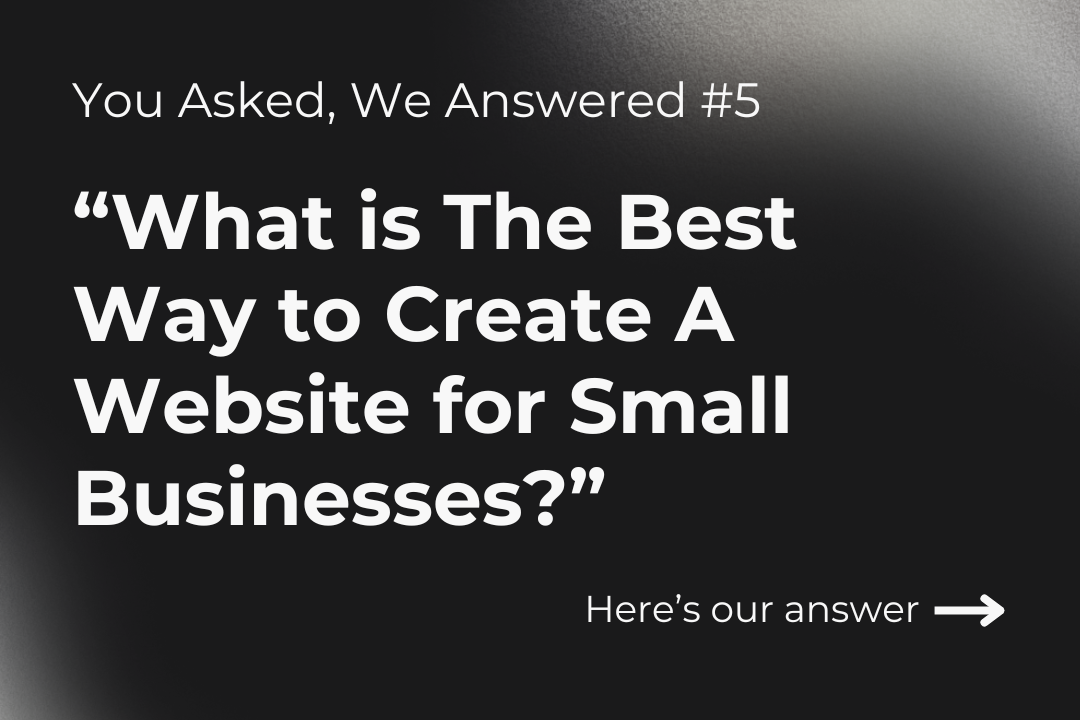Best way to create a website for small businesses
The best way for small businesses to create a website is to hire a professional website design agency with experience and a strong portfolio. But if you have an in-house team of website designers, then selecting a website builder platform will be the best choice.
Without a doubt, a well-designed website can significantly impact one’s business success. So in this blog, we will dive into the details of how businesses can get a website, to help you make a better choice.
2 ways small businesses can get a website
1. Hiring a website design agency
Opting to hire a professional website design agency can be a strategic move for small businesses aiming for a high-quality, customized online presence.
Benefits of hiring a website design agency
Expertise and experience:
Professional website design agencies bring a wealth of knowledge and experience, ensuring your website is designed to the highest standards. They understand the latest design trends, best practices, and technologies.Customization:
Agencies can create a tailor-made website that meets your specific business needs and goals. They work closely with you to understand your vision and bring it to life, resulting in a unique and personalized website.SEO Optimization:
Website design agencies deeply understand SEO and will design your site to rank well on search engines. They implement best practices from the start, helping your site achieve better visibility and attract more organic traffic.Ongoing support:
Professional agencies provide ongoing support and maintenance, ensuring your website remains up-to-date, secure, and functioning smoothly. They can handle updates, troubleshooting, and improvements as needed.Time and resource efficiency:
By outsourcing your website design, you save valuable time and resources that can be better spent on running your business. The agency handles all technical aspects, allowing you to focus on your core operations.
For businesses looking to achieve mobile-friendly and conversion-focused websites, consider reaching out to Pillars Media.
We specialize in creating websites that not only look great but also drive results. Our team is dedicated to delivering a seamless experience from start to finish, ensuring your website meets all your business objectives.
Read more: How to Choose A Website Design Agency?
2. Selecting a website builder platform
Using a website builder platform is a practical option for small businesses looking to create their own websites without significant technical expertise. Here are some popular choices:
WordPress
WordPress is one of the most popular website builders, known for its flexibility and scalability, making it suitable for various business types.
WordPress offers a vast library of plugins and themes, allowing you to customize your site extensively to match your brand’s identity. Its open-source nature means you have control over every aspect of your website’s functionality and appearance. Whether you need an e-commerce store, a blog, or a professional portfolio, WordPress provides the tools to build it.
Detailed features:
- Customization: With thousands of themes and plugins, you can create a unique website tailored to your specific needs.
- SEO friendly: Built-in SEO features and additional plugins help improve your site’s visibility on search engines.
- Community support: A large community of developers and users offers extensive resources and support.
Wix
Wix is renowned for its user-friendly, drag-and-drop interface, making it accessible to those with little to no technical skills.
Wix simplifies the website creation process, enabling you to build a professional-looking site quickly and efficiently. Its intuitive interface allows you to design your website visually, without needing to write a single line of code.
Detailed features:
- Ease of use: The drag-and-drop editor lets you customize your site’s layout and design effortlessly.
- Templates: Hundreds of designer-made templates to choose from, suitable for different industries.
- App market: A variety of apps to extend your website’s functionality, from booking systems to online stores.
Squarespace
Squarespace stands out with its sleek, modern design templates and robust features, making it ideal for businesses that prioritize aesthetics.
Squarespace’s beautiful templates are perfect for showcasing products and services in an appealing and professional manner. It is particularly favored by creative professionals such as photographers, artists, and designers.
Detailed features:
- Design quality: High-quality, visually stunning templates that can be customized to reflect your brand.
- All-in-one platform: Integrated features for blogging, e-commerce, and analytics.
- 24/7 support: Reliable customer support to assist with any issues or questions.
Key points small businesses should not neglect when creating a website
1. User experience (UX)
User experience is a critical factor that determines how visitors interact with your website. A seamless UX ensures that visitors find what they’re looking for easily and enjoy their time on your site.
A well-designed UX improves customer satisfaction and increases the likelihood of conversion. If visitors find your website intuitive and easy to navigate, they are more likely to stay longer, explore your offerings, and ultimately make a purchase or contact you.
- Navigation: Simplified and intuitive navigation menus help users find information quickly.
- Loading speed: Fast-loading pages keep users engaged and reduce bounce rates. Tools like Google PageSpeed Insights can help optimize your site’s performance.
- Visual hierarchy: Use design principles to guide users’ eyes to the most important elements, such as CTAs and product highlights.
An online store with a clear and simple checkout process can significantly reduce cart abandonment rates. Including progress indicators and minimizing form fields can enhance the user experience during checkout.
2. Mobile optimization
With the increasing use of smartphones, having a mobile-optimized website is no longer optional—it’s essential. Mobile optimization ensures that your site provides a positive experience on all devices.
A mobile-friendly site ensures that visitors have a positive experience regardless of the device they use. Mobile optimization affects not only user satisfaction but also search engine rankings, as Google prioritizes mobile-friendly websites in search results.
- Responsive design: Ensure your website automatically adjusts to different screen sizes and orientations.
- Touch-friendly elements: Design buttons and interactive elements large enough to be easily tapped on a mobile device.
- Mobile-specific features: Implement mobile-specific features such as click-to-call buttons and simplified navigation.
Google’s Mobile-Friendly Test can help you determine how well your site performs on mobile devices. A high mobile usability score can boost your site’s visibility in search results, potentially increasing traffic and conversions.
3. Search engine optimization (SEO)
SEO is the practice of optimizing your website to rank higher on search engine results pages (SERPs). Good SEO practices are vital for driving organic traffic to your website.
Effective SEO makes your website more visible to potential customers searching for relevant products or services. Higher visibility on search engines leads to increased traffic, which can result in more leads and sales.
- Keyword research: Identify and use relevant keywords that your target audience is searching for. Tools like Google Keyword Planner can help.
- On-page SEO: Optimize title tags, meta descriptions, headers, and content with relevant keywords.
- Technical SEO: Ensure your website’s technical aspects, such as XML sitemaps, robot.txt files, and schema markup, are optimized for search engines.
- Backlinks: Building quality backlinks from reputable sites enhances your site’s authority and ranking.
Using keywords like “website for small businesses” and “creating a website for small business” strategically throughout your content can help your site appear in search results when users look for these terms. Regularly updating your blog with SEO-optimized content can further improve your rankings.
4. Content quality
High-quality content is essential for engaging visitors and establishing authority in your industry. Content includes everything from the text on your homepage to blog posts and product descriptions.
Informative and valuable content attracts and retains visitors, turning them into loyal customers. Quality content also supports your SEO efforts, as search engines favor sites that provide useful and relevant information.
- Relevance: Ensure your content addresses the needs and interests of your target audience.
- Clarity: Write clearly and concisely, avoiding jargon and overly complex language.
- Engagement: Use a mix of text, images, videos, and infographics to keep visitors engaged.
- Updates: Regularly update your content to reflect the latest industry trends and information.
A blog that provides useful tips and insights related to your industry can position your business as an authority. For instance, a digital marketing agency might publish articles on the latest SEO trends, attracting businesses looking for up-to-date marketing strategies.
5. Call-to-actions (CTAs)
Effective CTAs guide visitors toward desired actions, such as making a purchase, signing up for a newsletter, or contacting your business. They are crucial for converting visitors into customers.
CTAs help convert visitors into customers by clearly directing them on what to do next. Without clear CTAs, visitors may leave your site without taking any action, resulting in lost opportunities.
- Clarity: Use clear and concise language to tell visitors exactly what you want them to do.
- Visibility: Place CTAs in prominent locations where they are easily noticeable, such as at the end of blog posts or on the homepage.
- Urgency: Create a sense of urgency with phrases like “Limited Time Offer” or “Sign Up Now.”
A compelling CTA like “Get a Free Quote Today!” placed on your homepage can encourage visitors to engage with your business. Ensure the CTA button stands out with a contrasting color and is easy to find.
Conclusion
Creating a website for your small business involves careful planning and consideration of various factors.
At Pillars Media, we specialize in designing websites that are not only visually appealing but also functional and conversion-focused. Based in Malaysia, we have worked with clients globally, helping businesses create impactful online presence.
Contact us at Pillars Media for professional website design services that deliver results.
You Asked, We Answered
“You Asked, We Answered” is one of our content segments where we collect questions related to digital marketing, website design, leads generation, Google Ads, and more, from different platforms (Reddit, Quora, etc.), and answer them here!
We’ll be sharing a lot more on our website. If you are interested in reading more of these, let us know through our email!

